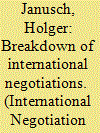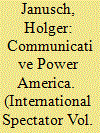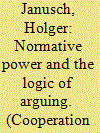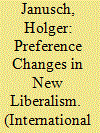|
|
|
Sort Order |
|
|
|
Items / Page
|
|
|
|
|
|
|
| Srl | Item |
| 1 |
ID:
182619


|
|
|
|
|
| Summary/Abstract |
A theoretical gap in the audience cost theory is the missing analysis of its central feature: the audience. This article defines the audience as a group composed of individuals and societal actors that can punish a government and pay attention to the issue being negotiated. Thus, the audience can vary depending on the issue salience. When the issue salience is low, the audience comprises just interest groups and the attentive public. Yet, the higher the issue salience, the more voters of the general public also become part of the audience. The audience’s composition in turn determines the level of the audience costs. Because the general public tends to evaluate national honor more highly, be less informed and have less well-defined preferences than interest groups and the attentive public, the audience costs should be higher when the issue salience is high. Furthermore, the audience can take actions that prevent the effect of audience costs or generate exogenous audience costs.
|
|
|
|
|
|
|
|
|
|
|
|
|
|
|
|
| 2 |
ID:
148546


|
|
|
|
|
| Summary/Abstract |
This article examines whether the two-level game can theoretically explain negotiation breakdowns without referring to uncertainty alone. For this purpose, social conflicts are integrated in the two-level game. In this light, the classical hypothesis that smaller win-sets increase the risk of a negotiation breakdown can no longer be maintained. Instead, conflict intensity – and thereby the risk of breakdown – correlates with the intersection of the win-sets in the form of an inverted U-curve. It follows that negotiations are most likely to break down when the intersection of the win-sets is perceived as medium-sized, because the bargaining space and thereby the potential of conflict intensity is largest/highest. Furthermore, the insertion of social conflicts into the equation runs counter to the hypothesis that issue linkages facilitate international cooperation. On the contrary, issue linkages increase the risk that goal conflicts, in particular, intensify each other by spreading from one issue to another.
|
|
|
|
|
|
|
|
|
|
|
|
|
|
|
|
| 3 |
ID:
186124


|
|
|
|
|
| Summary/Abstract |
President Trump’s credo ‘America First’ marked an end to American exceptionalism. Against this backdrop, President Biden aims to restore America’s moral leadership. Yet, he lacks a clear vision. Against the Trump doctrine and realist arguments for the end of a values-driven foreign policy, we propose a vision for a US foreign policy guided by self-restraint and critical self-reflection. We argue that following such vision is in the strategic interest of the United States. The search for a vision for a US grand strategy is not just an abstract question for International Relations scholars, but of high importance for practice. Shared visions are crucial if not necessary for successful leadership.
|
|
|
|
|
|
|
|
|
|
|
|
|
|
|
|
| 4 |
ID:
149496


|
|
|
|
|
| Summary/Abstract |
The concept of Europe as a normative power can be understood as a theoretical attempt to define a new type of protagonist in world politics, distinct from older concepts such as empire, hegemonic power, or great power. Because many scholars have used universal norms as a criterion for ‘normative power Europe’, the concept is often criticized as hidden Eurocentrism, soft imperialism, or hegemony. In this article, a normative power is defined not by the universality of the norms it seeks to diffuse, but by the underlying logic according to which it acts. A normative power takes communicative actions and acts in accordance with the logic of arguing, not consequentialism. This definition of normative power escapes the trap of a hidden Eurocentric imperialism by abstracting the theoretical concept from the specific case of Europe and detaching it from the criterion of universal norms.
|
|
|
|
|
|
|
|
|
|
|
|
|
|
|
|
| 5 |
ID:
160866


|
|
|
|
|
| Summary/Abstract |
In classical two-level games, international cooperation is less likely when there is large programmatic distance and smaller domestic win-sets as a result of changing preferences. The US trade negotiations with South Korea and Colombia question this hypothesis and emphasize two empirical insights that can be integrated into the two-level game to improve its explanatory power. First, smaller win-sets due to preference changes can mitigate conflicts of distribution and make cooperation more likely if the negotiators are aware of the smaller win-sets. Second, when negotiators perceive the already achieved bargaining results as a new status quo, former positive sum games can transform into zero sum games, which makes cooperation more difficult, irrespective of the size of the win-sets. Negotiators who perceive conflicts as zero sum games will put more effort into avoiding losses and, as a result, domestic constraints cannot be used as bargaining levers vis-à-vis a foreign country.
|
|
|
|
|
|
|
|
|
|
|
|
|
|
|
|
|
|
|
|
|